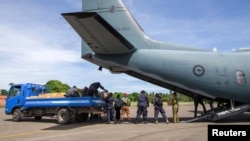Voting has begun in Papua New Guinea's marathon national elections as the Prime Minister faces an arrest warrant for corruption. Peter O’Neill’s People’s National Congress won the last poll in 2012, but critics are accusing him of “burying” the economy in debt.
Papua New Guinea, or PNG, is a South Pacific nation of almost 7 million and lies to the north of Australia. About 5 million voters will elect members of Papua New Guinea’s 111-seat parliament. Occupying the eastern half of the island of New Guinea and numerous islands, PNG is a land of rugged terrain and voting will last for two weeks. Many voters have to walk for hours to cast their ballot. A final result is not expected until late July.
Opponents of Prime Minister O’Neill say he has caused economic collapse in a country with rich natural resources that has been hit by falling global commodity prices. PNG has high levels of unemployment, crime and poverty.
O’Neill, who has steadfastly denied allegations of corruption, has resisted months of protests and civil disobedience urging him to resign. He survived a parliamentary no-confidence vote last year.
He has told Australian television that he has nothing to hide.
“I am not above the law. I am quite happy to go to courts like anyone else, and I have proven time and time again that those allegations are not true and have been politically motivated in many cases. The ballot will speak for itself. So all the thing that we have listed down, we have achieved well over 90 per cent of it. For any government that is a high achievement. This has never been done before,” said O’Neill.
Mineral deposits, including copper, gold, and oil, make up almost two-thirds of PNG’s export earnings. There are also huge reserves of natural gas, but the exploitation of these resources has been hindered by rugged terrain and land rights issues. Villagers often complain that they have yet to receive royalty payments from large resource projects.
A record number of women are standing in the election. No party has ever won a majority, so another coalition government appears likely.
Papua New Guinea, a former Australian colony, is a member of the Commonwealth grouping of former British colonies.
Australia is PNG’s largest aid donor, and has been working alongside electoral authorities to ensure the election goes smoothly, while more than 10,000 police and other personnel have been deployed to maintain security.




